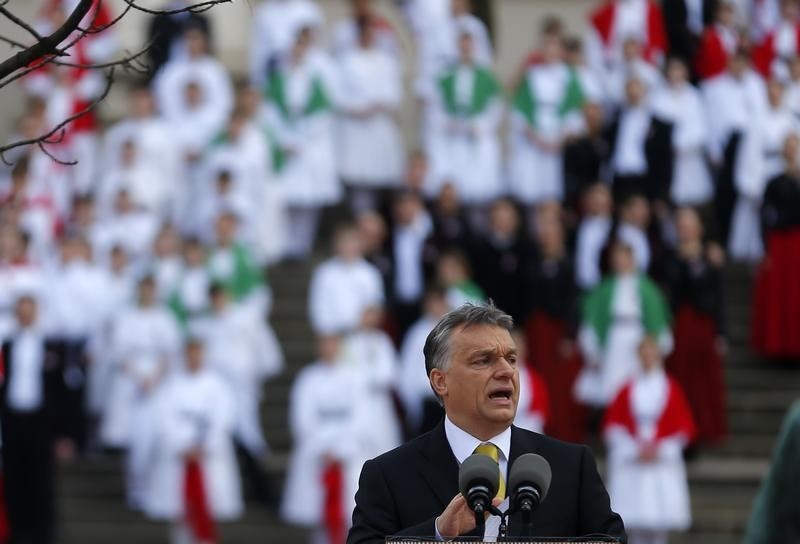By Krisztina Than and Christian Lowe
BUDAPEST/WARSAW (Reuters) - What should have been Hungarian Prime Minister Viktor Orban's finest hour may be becoming his darkest.
Investors are turning positive again on Hungarian assets, vindicating Orban after years when the International Monetary Fund, Brussels, and international financiers lined up to warn that he was going to destroy Hungary's economy.
He proved them wrong, but at the same time his popularity with voters, which stayed resilient even when the economy spluttered, is ebbing.
A survey by Ipsos last month put Orban's Fidesz party on 21 percent, still the poll leader, but with the far-right party Jobbik at 18 percent, its highest ever score. In a by-election last weekend, Jobbik won a parliamentary seat previously held by Fidesz.
It is a bitter irony for a right-wing leader who fought fierce battles with critics over his stewardship of the economy precisely because, he said, he was determined to give the Hungarian people the prosperity they deserve.
People walking in central Budapest said if the economy was improving, they were not feeling the effects themselves. Instead, they said, they see a ruling class serving its own interests.
"The economy should not be developed in a way that enriches a narrow layer of people," said Eva, a 75-year-old who said she used to vote for Fidesz in the 1990s.
HISTORIC CHANGE
"We may be at the start of a historic change," Peter Tolgyessy, a former lawmaker who was in the Fidesz faction in parliament, told broadcaster Inforadio.
Orban has been hurt by a series of media reports about senior Fidesz party figures living in properties that seem to be beyond their modest means. They say the properties were brought with help from relatives.
A proposed tax on Internet traffic had to be quickly dropped after tens of thousands of people protested. That raised questions about whether Orban's usually deft political instincts had deserted him.
Orban has also fallen out with Lajos Simicska, one of Hungary's richest men whose newspapers and television station have for years provided sympathetic coverage.
A newspaper co-owned by Simicska, Heti Valasz, this week wrote in an editorial that "Fidesz's relation with everyday reality seems to be weakening" and that the party risked slipping into terminal decline.
Fidesz's misfortune is being exploited by Jobbik. Condemned throughout Europe as anti-Semitic and racist, it is trying to re-model itself as a credible, right-wing Eurosceptic party.
In essence, it is offering itself to voters as a version of Fidesz, but more plain-spoken and untainted by years in office.
POPULIST RISKS
By any measure, Hungary's economic turnaround under Orban has been remarkable. Before he took power, a Socialist government had to seek an international bailout to avoid defaulting in 2008 when the global economic crisis hit the country.
With measures including special taxes on banks and selected sectors such as telecoms, energy and retail, the budget deficit has come under three percent and debt is coming down slowly.
The yield on Hungarian sovereign bonds of all types, a measure of how the market views the risk of holding Hungarian debt, hit record lows earlier this year.
Ratings agency Standard & Poor's last month gave Hungary its first upgrade since 2011.
Market insiders worry that if these improvements do not translate soon into better opinion poll ratings in good time for the next election, in 2018, Orban may be tempted to abandon fiscal caution.
Officials in the past few weeks have raised the idea of a potential cut in value-added-tax sometime before 2018, which would provide instant benefit to consumers but hurt tax revenues.

"Fidesz's declining approval ratings raise risks of populist policy choice," said Bank of America (NYSE:BAC) Merrill Lynch.